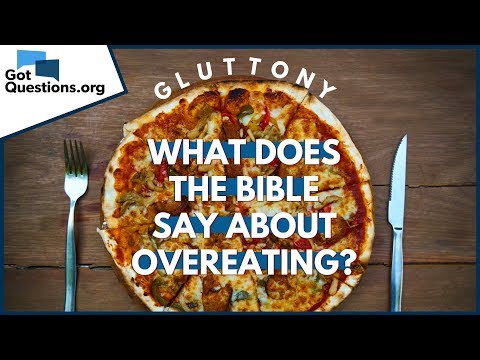What Does Bible Say About Overeating: A Biblical Perspective
The Bible considers overeating to be a sin if it leads to a lack of control over one’s relationship with food or harms the body. Gluttony is viewed as one of the seven deadly sins in certain Christian denominations.
Despite the consequences, many individuals struggle with overeating and seek guidance from the Bible on how to address this issue. This article explores what the Bible says about overeating and provides relevant Bible verses for reflection and encouragement. By delving into the truth of God’s Word, individuals can find solace and guidance in their journey towards healthier eating habits and a balanced relationship with food.
The Consequences Of Overeating
Overeating can have significant consequences on both our physical and mental well-being, as well as our emotional state. In the Bible, the concept of gluttony is mentioned as a sin, highlighting the importance of moderation and self-control when it comes to our eating habits. Let’s explore some of the consequences of overeating in more detail:
Physical Health Implications
When we consistently overeat, our bodies face various physical health implications. These can include:
- Weight Gain: Overeating often leads to consuming more calories than the body needs, resulting in excess weight gain.
- Obesity: Excessive overeating can contribute to obesity, which is linked to numerous health issues such as diabetes, heart disease, and joint problems.
- Digestive Problems: The digestive system can become overwhelmed with large and frequent meals, leading to issues like bloating, indigestion, and acid reflux.
- Increased Risk of Certain Diseases: Overeating can increase the risk of developing conditions like high blood pressure, high cholesterol, and certain types of cancer.
Mental And Emotional Effects
Overeating doesn’t just impact our physical health, but it also has mental and emotional effects. These can include:
- Guilt and Shame: People who struggle with overeating often experience feelings of guilt and shame, as they may feel out of control or unable to manage their eating habits.
- Low Self-Esteem: The negative emotions associated with overeating can contribute to low self-esteem and negative body image.
- Depression and Anxiety: Overeating can trigger or worsen symptoms of depression and anxiety, as it can become a coping mechanism for handling stress or emotional distress.
- Disordered Eating Patterns: Chronic overeating can lead to the development of disordered eating patterns, such as binge eating disorder or emotional eating.
It is important to note that the Bible encourages us to care for our bodies, as they are considered temples of the Holy Spirit. By practicing moderation and self-control in our eating habits, we can ensure good physical and mental health, honoring the biblical teachings.

Credit: www.joyfulhealth.co
Biblical Teachings On Gluttony
Overeating is a common struggle that many people face in today’s culture of abundant food. However, the Bible has something to say about this issue. Let’s explore the biblical teachings on gluttony and how it addresses the problem of overeating.
In Christianity, gluttony is considered a sin that goes against God’s will for our lives. The excessive desire for food, leading to a lack of self-control and harming the body, is seen as a violation of our relationship with God and the body He has given us. Some Christian denominations even consider gluttony as one of the seven deadly sins.
While overeating may seem like a difficult habit to break, the Bible encourages believers to seek self-control and resist the temptation to indulge in excess. Proverbs 25:28 reminds us that “A person without self-control is like a city with broken-down walls.” By cultivating self-control and relying on God’s strength, we can overcome the temptation to overeat and honor our bodies as temples of the Holy Spirit.
God’s Word also emphasizes the importance of taking care of our bodies. 1 Corinthians 6:19-20 states, “Or do you not know that your body is a temple of the Holy Spirit within you, whom you have from God? You are not your own, for you were bought with a price. So glorify God in your body.” This verse reminds us that our bodies are precious gifts from God, and to honor Him, we should strive to maintain good health and make wise choices when it comes to our diet.
Seeking God’s Guidance For Overeating
When it comes to overeating, seeking God’s guidance is an essential step towards finding healing and transformation. The Bible offers valuable insights and principles that can help us overcome the struggle with overeating and cultivate a healthier relationship with food. Through prayer, meditation, and the support of faith communities, we can find strength, guidance, and ultimately freedom from the bondage of overeating.
Prayer And Meditation
Prayer and meditation are powerful tools that can help us in our journey to overcome overeating. By turning to God in prayer, we can pour out our hearts, express our struggles, and seek His wisdom and guidance. The Bible encourages us to “cast all our anxieties on Him because He cares for us” (1 Peter 5:7). Through prayer, we can surrender our desires for excess food and ask for strength to make healthier choices.
Meditation, on the other hand, involves quieting our minds and focusing on God’s Word. It allows us to tune into His voice and gain clarity amidst the noise of our desires. By meditating on verses like “I can do all things through Christ who strengthens me” (Philippians 4:13), we can find the strength and motivation to resist overeating temptations.
Finding Support In Faith Communities
In addition to prayer and meditation, finding support in faith communities is crucial. Surrounding ourselves with like-minded individuals who share our faith and struggles can provide encouragement, accountability, and practical advice. Together, we can study relevant Bible passages, share personal experiences, and uplift one another in prayer.
Joining small groups or support groups within our local church or community can create a safe space for us to open up about our struggles with overeating. We can find solace in knowing that we are not alone in this journey and that others face similar challenges. By sharing our stories, we can inspire and be inspired by others, strengthening our resolve to overcome overeating through the power of God’s grace.
Moreover, attending church services and participating in worship can serve as a constant reminder of our reliance on God. It reminds us that our bodies are temples of the Holy Spirit (1 Corinthians 6:19) and prompts us to treat them with respect and care.
In conclusion, seeking God’s guidance for overeating is not a journey we have to embark on alone. Through prayer, meditation, and the support of faith communities, we can find the strength, wisdom, and accountability to overcome the struggle with overeating. Together, let us lean on God, trust in His promises, and find healing and freedom from the bondage of overeating.

Credit: m.youtube.com
Overcoming Overeating Through Biblical Principles
Overcoming overeating through biblical principles is a topic that resonates with many individuals striving to find balance and self-discipline in their lives. The Bible offers valuable insights and guidance on addressing overeating through spiritual and practical approaches. By incorporating biblical principles, individuals can find the strength and wisdom to overcome the challenges of overeating and cultivate a healthier lifestyle.
Practicing Self-discipline
The Bible emphasizes the importance of self-discipline in managing our behaviors and desires. Self-discipline is a fundamental principle for overcoming overeating and promoting moderation in all aspects of life. Proverbs 25:28 admonishes, “Like a city whose walls are broken through is a person who lacks self-control.”
Renewing The Mind
Renewing the mind is a transformative principle taught in the Bible. Romans 12:2 encourages believers to “be transformed by the renewal of your mind.” By aligning our thoughts with God’s truth, we can overcome negative patterns, including overeating, and develop a renewed perspective on food and self-control.
Gratitude And Contentment
The Bible teaches the significance of gratitude and contentment in all circumstances. 1 Thessalonians 5:18 exhorts, “Give thanks in all circumstances; for this is God’s will for you in Christ Jesus.” Cultivating an attitude of gratitude and contentment can help individuals combat overeating tendencies by fostering a spirit of satisfaction and fulfillment in God’s provision.
Applying Biblical Wisdom To Healthy Eating Habits
Understanding the Bible’s teachings on overeating and healthy eating habits can provide valuable insight into developing a balanced approach to our diets. The Bible offers guidance on honoring God through the choices we make regarding nutrition and how to view food as a gift from Him. By applying this wisdom, we can cultivate a healthy relationship with food and maintain balance in our eating habits.
Understanding Food As A Gift
The Bible teaches us to view food as a gift from God, providing nourishment and sustenance for our bodies. By recognizing food as a blessing, we can approach our meals with gratitude and mindfulness, cherishing the nourishment it provides. This perspective can help us avoid overindulgence and promote a sense of reverence for the sustenance we receive.
Honoring God Through Nutrition
Honoring God through nutrition means making choices that align with biblical principles of stewardship and self-discipline. This involves prioritizing nourishing foods that support our well-being and avoiding overindulgence and gluttony. By treating our bodies as temples and making deliberate, godly choices about what we consume, we can bring glory to Him through our eating habits.
Maintaining Balance
The Bible exhorts us to exercise self-control and moderation in all things. This extends to our approach to food, emphasizing the importance of balance and restraint in our eating habits. By seeking balance, we can avoid the pitfalls of overeating and gluttony while enjoying the gifts of God’s provision. This balanced approach fosters harmony between our physical nourishment and our spiritual well-being.

Credit: www.gotquestions.org
Frequently Asked Questions For What Does Bible Say About Overeating
What Does It Say In The Bible About Eating Too Much?
The Bible considers excessive eating, known as gluttony, to be a sin that lacks self-control and harms the body. It is often associated with the seven deadly sins in Christianity.
Is Overeating A Sin In The Bible?
In Christianity, overeating is considered a sin if it leads to a lack of control or harm to the body. Gluttony is seen as one of the seven deadly sins.
What Is It Called When You Eat Too Much In The Bible?
In Christianity, eating too much is called gluttony and it is considered a sin if it leads to lack of control or harms the body. Some Christian denominations view gluttony as one of the seven deadly sins.
What Does The Bible Say About Gluttony And Obesity?
The Bible considers gluttony a sin, linking it to a lack of control and harm to the body. Some Christian denominations view gluttony as one of the seven deadly sins.
Conclusion
In the Bible, overeating is regarded as a sin, as it reflects a lack of control and an excessive desire for food. Gluttony is considered one of the seven deadly sins in certain Christian denominations. It is important to understand that with the grace of Jesus, we can overcome these temptations and seek guidance from God’s Word.
By reflecting on Bible verses about gluttony and overeating, we can find strength and motivation to address these issues and live a healthier, more balanced life.














